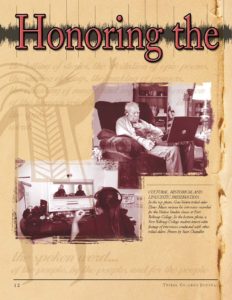Honoring the Word: Classroom Instructors Find That Students Respond Best to Oral Tradition
Excerpt
But in numerous ways it has become evident to me that Native communities generally value “the word” itself above the art of writing and that there are, in fact, powerful and compelling reasons why this is so. In recent interviews for this article, I have found this opinion to be widely shared among tribal educators.
Let me express these contrasting views as I have come to understand them. The Western view: A gifted individual, such as a Shakespeare, out of his own imagination uses the many complex techniques of rhetoric and composition to create a work of art, which we lesser mortals struggle to fully appreciate through a complicated process we call literary analysis.
The Indigenous view: The oral tradition represents “the other side of the miracle of language” as described by N. Scott Momaday in The Man Made of Words: “the telling of stories, the recitation of epic poems, the singing of songs, the making of prayers, the chanting of magic and mystery, the exertion of the human voice upon the unknown—in short, the spoken word.” To paraphrase a familiar document, this sounds to me very much like a literature “of the people, by the people, and for the people.”
The basic difference here can be simply stated as the Tribe vs. the Individual.


